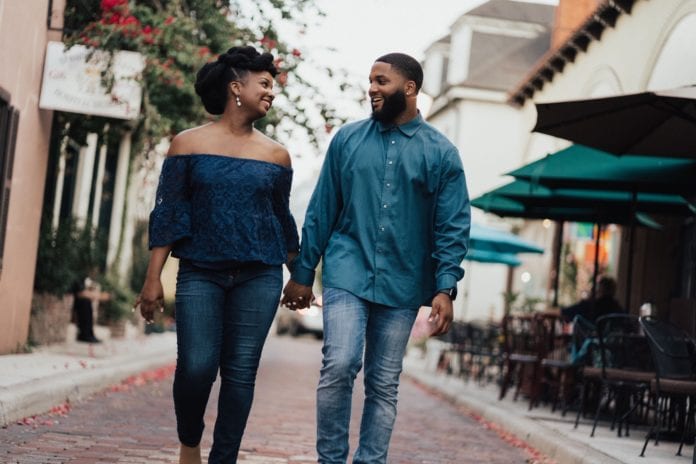Save the dates were sent, photos were taken, vendors were booked, wedding countdowns began and then the coronavirus hit.

The COVID-19 has disrupted daily life around the world and there’s no clear answers to what the future may bring. Now couples engaged to be married in the coming year, such as my fiancé and I, are faced with decisions regarding whether it’s best to postpone, cancel, continue or adjust plans for the special day.
As of March 15, 2020, the Centers for Disease Control and Prevention (CDC) has recommended the cancellation of large gatherings, including weddings, for eight weeks. While unfortunate, this means that weddings are out until mid-May, or possibly longer.
There were approximately 23,000 weddings scheduled to have taken place in the United States this past weekend, according to the Knot, a popular wedding-planning website.
Weddings represent the antithesis of social distancing. They’re gatherings of intimate friends and mysterious personages, many of whom arrive via a complex network of travel options.
Jonathan and Tsciena Barnes were set to re-say their vows on March 21 in St. Augustine, Florida, a small tourist city on the Atlantic coast about 40 minutes from Jacksonville.
“We weren’t as upset about having to postpone our wedding because we got married legally May 18, 2019,” said Jonathan. “It was a small ceremony with our immediate family in St Augustine, Florida and afterwards we went on our honeymoon.”
Their plan to return to St. Augustine for a more formal ceremony was hijacked by virus concerns.
They, like other engaged couples, were stuck in limbo, planning as if the wedding was still on while following the coronavirus news and realizing the chances of it happening — at least in the way they imagined — were getting slimmer.
“We decided to postpone on March 16, the Monday before our wedding,” said Tsciena. “Guidelines were issued on that day, requesting the public’s compliance with limiting mass gatherings to no more than 10 people.”
Jonathan said, “We had a lot of family and friends traveling as well as elderly guests and we believed that postponing was our only option to not expose our loved ones to the virus.
“We started by calling the venue first, then our wedding coordinator, guests and then the other vendors to fill them in on our decision. The process was pretty easy. Every one of them were understanding and accommodating.”
Tsciena added, “Having to postpone the wedding after a year’s worth of anticipation and planning wasn’t ideal, but the situation was beyond our control and ultimately the health and safety of our friends and family come first.
“We’re grateful that our vendors have been flexible and our loved ones are still excited to celebrate with us at a later date.”
It’s not just guests and couples who are feeling the effects of the pandemic. The coronavirus outbreak, like it has in other sections of the economy, is expected to have a profound impact on the $100-billion-a-year wedding industry.
“The wedding industry is obviously enormous,” said Kristen Maxwell Cooper, editor-in-chief at the Knot. “There’re about 1.8 million weddings that happen every year. So that’s a ton of money. A ton of people that are impacted by this.”
When I reached out to wedding planner and event designer Delyrria Franklin, she didn’t have very long to chat. She was busy on the phone with couples and their vendors about the status of their upcoming nuptials.
It’s a scene that’s increasingly playing out for vendors as couples rearrange wedding plans amid fears over COVID-19 and travel restrictions.
“I’ve had to completely postpone weddings and/or work with couples to determine how to still have their wedding within the restrictions of the pandemic,” said Franklin. “It’s difficult to reschedule an entire wedding within a week and then have to make sure all vendors are available on a later date.”
Franklin understands that an upcoming wedding in “an emotional” time for couples.
“I remind them that they are still on a journey to become one, it may just look a little different than what they originally planned or it may have to happen at a later date.
“I also ensure them that as their wedding planner, I am with them every step of the way and that the changes we’re making are for the health interests of everyone.”
Nakeisha Green, a local florist and owner of Petals Studio, prides herself on her custom wedding flower bouquets.
Aside from weddings — the early spring season is huge for florists — and leads into Easter and proms.
“We are working from a proactive standpoint, trying to reschedule our affected events as quickly as possible so we can start the process of transitioning plans and vendors to a new date.
“Once the new date is locked in, we can go back to a state of normalcy with planning,” Green said. “We really want to give our clients a sense of calm as quickly as possible to help restrict the negative emotional impact of the virus as much as we can.”
She added, “The upside of this is I have some time to play catch up — check inventory, update my website and restructure the in-house business.”
As I scrolled through my Instagram timeline, I came across a flier postponing the wedding of my friends Savannah Clay and Cullen Johnson.
They were initially getting married in June, but decided to postpone on March 21.
“We realized that the situation was becoming worse and we didn’t want to put our loved ones at risk,” said Johnson. “We prayed about it and listed the pros and cons and eventually made the decision from there.”
Clay said, “Even though this wasn’t our original plan we are trusting God for what he has in store.”



